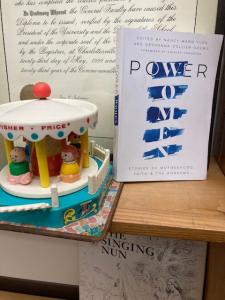“While women sometimes wished to be men in order to partake of their freedoms and opportunities, ‘men never.’”
This statement appears in Megan Marshall’s new biography of Margaret Fuller (1810-1850). The quotation continues: men never “in any extreme of despair, wished to be women,” Marshall summarizes, since there was nothing enviable in women’s lot, no advantages to be had in that direction. Fuller is a fascinating character, well anthologized and covered in earlier biographies but deserving of broader familiarity. Marshall’s new book serves that end.
Margaret is an important figure in American intellectual history. Educated by her father and by her own lights, Margaret taught school; led famous reading groups or “Conversations” for women, a sort of Great Books program for the wives and daughters of Boston luminaries; served as editor of the Transcendentalist literary journal The Dial; and was hired off by Horace Greeley to write for the New York Tribune. Covering for the Tribune the 1848-49 revolutions in Europe, Fuller was the first female foreign correspondent for an American newspaper and sent dispatches from the short-lived Roman Republic. Holed up on her own in a Rome apartment, she observed and recorded the fearful season when Pope Pius IX fled the Vatican in disguise and Tiber hospitals filled up with revolutionaries. Fuller married Giovanni Ossoli, a young Roman of faintly aristocratic status, and bore his son, whom she kept hidden away in the country with a wet nurse as fighting raged in the Eternal City. Fuller intended to publish her history of the Roman Republic upon return to the United States but the manuscript was lost—along with the lives of Margaret, Giovanni, baby Nino, and others, when their ship wrecked in a storm just off Fire Island, New York. The passengers drowned about 300 yards from shore.
Fuller was never much taken by orthodox Christianity, bucking against the Unitarian religious establishment, admiring religion as “the thirst for truth and good, not the love of sect and dogma,” and lampooned by poet James Russell Lowell as having “lived cheek by jowl,/Since the day I was born, with the Infinite Soul.” She belonged to the circle of Transcendentalists, a world Marshall already has displayed well in her 2006 joint biography of the three Peabody sisters, the Boston-Cambridge-Concord orbit of men like Ralph Waldo Emerson, Henry David Thoreau, George Ripley, and James Freeman Clarke, with smart women at its edges wondering what to do with their genius.
Fuller struggled long with the mismatch between her intellect and her opportunities, and considered the question in her major work, Woman in the Nineteenth Century. Unlike suffrage or other contemporary projects for female advancement, Fuller aimed not for uplift of women in general. Noting that men and women had like faculties in different measures, “[t]here is no wholly masculine man, no purely feminine woman,” she called for the development and elevation of the individual woman.
Fuller regretted that girls are told “they can’t do that” when they try to play ball or called “masculine” when they perform well at schoolwork. Her friend William Channing’s observation that Fuller was “overtasked by her father, who wished to train her as a boy,” echoes the lament of Elizabeth Cady Stanton’s father, who was said to have wished his smart daughter had been born a boy.
Under the circumstances, what girl wouldn’t think so too? Reading the biography presses contrasts with our own time, our schools and sports awash in a cheerful go-girl boosterism, girls told from early ages that they can be “anything they want to be.” Women now need not “wish to be men,” in Fuller’s language, to partake of those freedoms. But “men never”? Consider how curious to Fuller would be cases of boys asking to be treated as girls. Massachusetts commissioner of elementary and secondary education, Mitchell Chester, this spring issued fresh directives on school treatment of students questioning gender. Much aghast attention was paid to troubles that might arise over bathrooms and locker rooms, if students were allowed to go where preferred gender led them. Many factors might be at play in such difficulties. But if we place respectfully to the side the many principled concerns that could be offered on this matter, the situation is remarkable even in historical contrast.












